#UMPG Publishing
Explore tagged Tumblr posts
Note
https://www.tumblr.com/twopoppies/762188095662735360/wow-looks-like-irving-just-made-himself-a-boat
i don’t understand any of this stuff, but i thought harry was the owner of his music? with erskine and all that. is it the distribution rights that were sold? sorry, i’m dumb when it comes to this
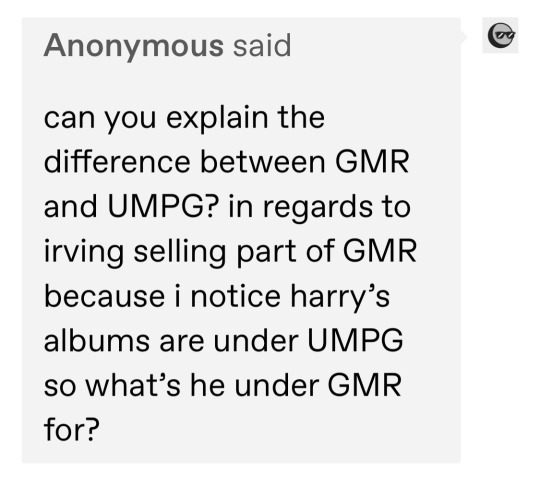
These questions are in reference to this anon I got last night:
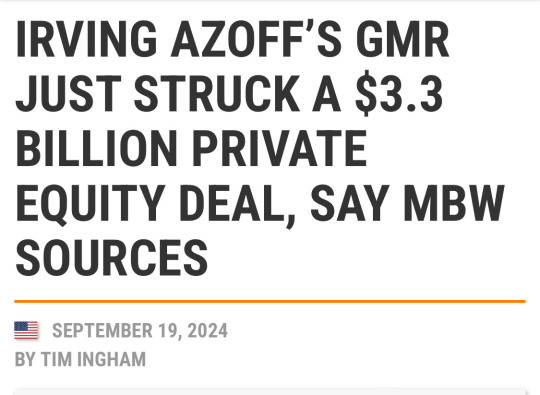
As far as I understand (and please someone correct me if I’m wrong or left something out), GMR is a Performance Rights Organization (PRO) like ASCAP, SEASAC, or BMI.
What is a PRO?
The way people and businesses play, purchase, listen to, and consume music has changed drastically in recent times. Revenues related to purchases of physical media and downloads are fading. Now, the attention is turning more than ever towards other sources of royalty revenues, such as performance rights. PROs play a major role collecting these rights and they monitor the compliance of businesses playing music in public.
PROs are in charge of administering the rights of songwriters and publishers. These duties include the collection and distribution of royalties on their behalf. It would be practically impossible for these creators to pick up their royalties one by one. There are too many instances, from digital platforms to physical venues, in which where their rights are being used. This network of agencies work to make sure that people pay all the royalties. In order to do this, they have close contact with different music platforms and checking physical locations, to collect and distribute them on the creators behalf.
x
From what I understand, Azoff’s stated intention in forming this group was to make sure artists were paid their fare share of royalties, given that the rules hadn’t been updated to take into account the current ways people consume music.
From GMR’s website:
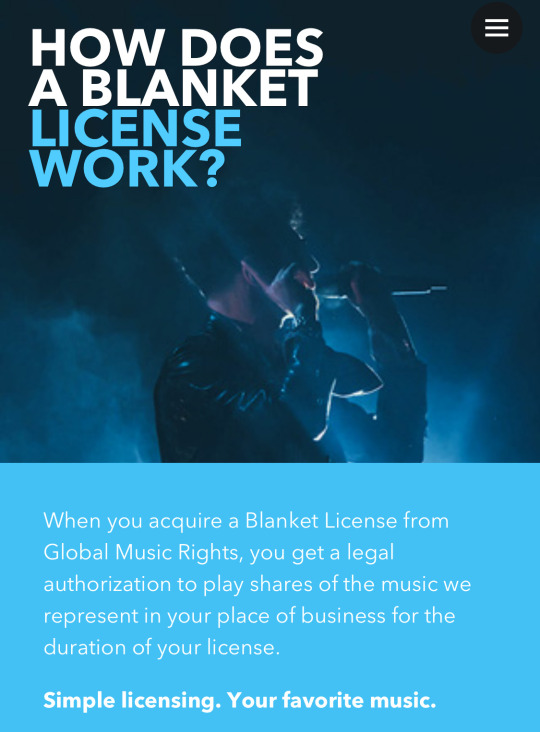
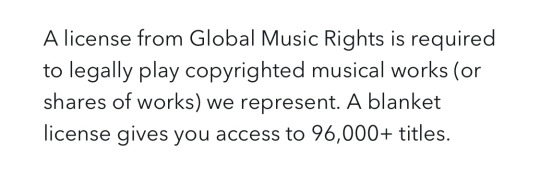
x
Basically, any business that uses music (or portions of music) in a public way must pay to license that music from GMR (or any of the other three PROs).
Who needs to buy a license?
So, if you have a restaurant that plays music in the background, if you use music when people are out on hold when they call your business, if you have a store that plays music while people shop… you have to have a license so that the artists/songwriters are paid each time their work is used.
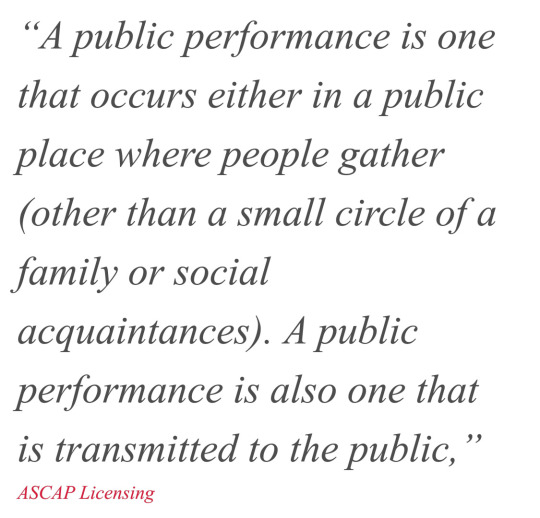
More details here x
Are there any exceptions? Yes.
The only exception is for broadcast radio and tv in businesses under 2000 square feet (3750 square feet for restaurants). Note: this rule applies only to “over-the-air” broadcasts, not internet streams or any other source of music. You’ll also be playing any DJ banter, unfiltered lyrics, and commercials for your competitors. Plus, there may be additional fees based on your type of establishment. For example, if you own a restaurant or bar that features live music, if there is a fee for entering your establishment, or if there is a physical activity coordinated with the music (such as public skating or dancing).
x
What is UMPG?
UMPG is an enormous music publishing company that offers a variety of different services. These range from administration services to creative services and much more.
They offer their services to companies including Universal Pictures, Warner Bros. Pictures, Lionsgate, MGM, Paramount, Disney Europe (and other territories), Viacom, Amazon, HBO, DreamWorks, DreamWorks Animation, Legendary Pictures, Mar Vista Entertainment, NBC and Sesame Workshop, among many others.
Universal Music Publishing Group’s Film & TV Department creates opportunities for and licenses their catalog of songs to film, television, advertising, computer games, and stage production. This is often referred to as ‘synchronization’.
x
UMPG focuses on traditional music publishing, licensing songs for use in film, TV, commercials, and more, and handling royalties for its songwriters. GMR focuses on managing public performance rights for a select group of high-profile artists. It offers more personalized and tailored services but is invitation-only, making it more selective and exclusive than UMPG.
Harry seems to have his music listed with both companies, as they handle different aspects of royalties.
TL;DR As far as I can tell (and I'm far from an expert), this all boils down to:
Erskine Records is primarily concerned with the release and distribution of Harry's music, partnering with Sony for wider reach. This covers the production, distribution, and promotion aspects of his music.
UMPG (Universal Music Publishing Group) manages his publishing rights. They handle songwriting royalties, licensing his music for use in films, TV, commercials, and other media, and collecting royalties when his songs are performed, played on the radio, or streamed online.
GMR (Global Music Rights) deals with performance rights. They ensure that when Styles' music is publicly performed (e.g., at concerts, in public spaces, etc., as explained above), the proper royalties are collected and distributed to him.
Additionally, we don't know how much of the GMR catalog has been sold. Nor do we know what the private equity firm plans to do with what it's bought. From the bit of research I've done, it seems that there is a move toward selling catalogs to private equity firms. For those firms, owning these rights is about more than passive income—it's about actively enhancing the value of the music through aggressive licensing, smarter technology, and even repackaging or reselling portions of the catalog for a higher return.
More info on that here and here
That's the best I can offer for now.
#long post#irving azoff#global music rights#erskine records#harry's career#music business#music industry#gmr#gmr sells catalog
23 notes
·
View notes
Text


🗓 6th Feb 2020: Taylor signed an exclusive global publishing agreement with Universal Music Publishing Group (UMPG).
5 notes
·
View notes
Text

@umpg_uk: Niall Horan with Mike McCormack - UMPG UK Managing Director, Harry Magee, Richard Griffiths -
@ModestMgmt “I’m so happy that I get to work with a man who genuinely cares about the art of writing a song & knows the world of publishing like no other” @NiallOfficial
39 notes
·
View notes
Text
TikTok has begun removing UMPG (Universal Music Publishing Group) content from its platform - includes Harry Styles music





Feb 27 2024. Select excerpts. For full article click here
10 notes
·
View notes
Text

umpg_uk: @niallhoran pictured with (L-R) Mike McCormack (UMPG UK Managing Director), Harry Magee (@modestmgmt) and Richard Griffiths (@modestmgmt)
Niall said: “It’s my absolute pleasure to sign with UMPG. I have known Mike personally for many years and I’m so happy that I get to work with a man who firstly genuinely cares about artistry and the art of writing a song, and secondly knows the world of publishing like no other. To have met the great Jody Gerson who I’ve known of throughout my career as being a badass publisher and when I felt the love from her and Mike, I wasn’t going anywhere else to be honest.”
Niall’s new album The Show, featuring co-writes from UMPG songwriters @jimmynapes and @tobiasjessojr, landed at No.1 on the UK albums chart last week. ✨
#NiallHoran #UMPG #TheShow #OneDirection
20 notes
·
View notes
Text
by Andre Paine | February 27th 2024
Universal Music Publishing Group songs are now being removed from TikTok.
As previously reported, the publisher’s controlled compositions were always set to join the removal of recordings of Universal Music Group by the end of February.
The major has been embroiled in a war of words with TikTok, as they failed to reach a new licensing agreement.
-> full report on musicweek.com
#so they did it#interesting..#tiktok#umg#music industry#record labels#music week#27.02.24#music news#link#m
4 notes
·
View notes
Note
A note on the streaming revenue conversation you were having.
Spotify doesn’t pay the same across the board it depends on a lot of factors and it works against artists like Louis, who proportionally get paid less.
Spotify pays a percentage of their net revenue (so the money they make after paying for their expenses). I don’t think the exact percentage of net revenue they pay is known but I heard it’s about 50%.
Q1 revenue for Spotify was €3B. I have no way of knowing what the net revenue is, so I’m just gonna run with €3B, but it’s significantly less than that. So 50% is €1.5B.
Off that, they have two types of royalties.
1. Recording Royalties.
2. Publishing royalties.
1. Recording Royalties are distributed to the “rightsholders” depending on what % of total streams their activity represents. Rightsholders = label or distributor. In Louis’ case, BMG is licensed for FITF, so them. In Harry’s case, Columbia.
Rightsholders then have individual agreements with each artist. Harry’s agreement with Columbia will be incredibly favorable for him because of the circumstances in which he signed his contract. Louis… idk! Also, Columbia has a HUGE percentage of the total share of streams because, well, it’s Columbia. In comparison, BMG gets a minuscule payout.
2. Publishing royalties. Once again, the money is distributed to the rightsholders, but in this case it’s the artist’s PRO + publisher. Harry is with UMPG and Global Music Rights, Louis is with PRS. There’s the publishing rights, and the mechanical rights, and the companies get a cut.
Then the artist often has a deal with their management company where they get a % of their revenue, calculated after everything is said and done. Harry owns a percentage of his management company.
BUT there’s more, what we have to keep in mind is that Spotify net revenue isn’t generated equally. Subscription pays more than ads, and that’s one avenue in which artist’s streams can pay more or less. A lot of Louis’ streams (at least for the first week of FITF) come from fans who create accounts on Spotify to inflate his numbers, those accounts are always free. That significantly lowers his income.
And lastly, Spotify doesn’t make the same amount of money for US streams than streams in Latin America. I’m Latina, that’s why I know I pay a lot less for my subscription than people in America or Europe.
I’m from Peru, here, 1 month premium coats S/ 29.90, which is around U$D 8.17. The same premium account in America costs $9.99.
This is a breakdown of Louis’ main cities and how much they pay for Spotify in dollars:
Jakarta - U$D 3.39
Mexico City - U$S 6.53
London - U$D 12.43
Santiago - U$D 5.28
Lima - U$D 8.17
São Paulo - U$D 4.06
Buenos Aires - U$D 1.74
Melbourne - U$D 8
Delhi - U$D 1.44
Mumbai - U$D 1.44
Kuala Lumpur - U$D 3.32
Monterrey - U$D 6.53
Bandung - U$D 3.39
Quezon City - U$D 2.31
Guadalajara - U$D 6.53
Average: U$D 4.97
This is Harry:
London - U$D 12.43
Mexico City - U$D 6.53
Jakarta - U$D 3.39
São Paulo - U$D 4.06
Sydney - U$D 8
Santiago - U$D 5.28
Melbourne - U$D 8
Los Angeles - U$D 9.99
Lima - U$D 8.17
Quezon City - U$D 2.17
Chicago - U$S 9.99
Paris - U$D 10.85
New York City - U$D 9.99
Toronto - U$D 7.37
Delhi - U$D 1.44
Average: U$D 7.18. That’s nearly 45% more, just FYI.
This also applies to ads, of course. It’s a lot more expensive to place ads on Spotify in the US or the UK than doing so in Latin America.
So, Harry makes more money because:
He has a better arrangement with his rightholders
Owns a percentage of his management company
His rightholders have a higher percentage of total streams on the platform
Has vastly more streams
Is streamed in countries that make more revenue
Also, he likely has a higher % of rights on his songs. There’s songs where Louis admits he barely tweaked them. Harry has the highest percentage of ownership in all of his songs of all the collaborators (whether it’s shared or alone). PLUS Harry works with a tight knit group of people who are friends with him.
TL;DR Harry made more money in streaming off Satellite than Louis off FITF
Thanks for this - very interesting and educational.
Louis has no top cities in the US or Europe so it's no wonder he's finding it hard to sell tour dates there. He should be prioritising Latam, India and Indonesia.
#louis tomlinson#harry styles#harry styles spotify#louis tomlinson spotify#faith in the future#great research
4 notes
·
View notes
Video
youtube
Special Request Ft Rey T - Girl Of My Dreams (Official Video) #music #m...
Girl Of My Dreams Special Request FT Rey T MRE Entertainment Symphonic/Merlin UMPG/IMPG/Money Rules Everything Publishing
Available everywhere music is streaming or sold! Listen to the music on your favorite radio station, if they don't play it, make a "Special Request" to play it.
Don't Cheat Yourself Treat Yourself!
Are you looking for Mr. Or Mrs. Right Or Mr. & Mrs. Right Now?
6 notes
·
View notes
Text
youtube
‘She Thinks I Still Care’ was co-written by Dickey Lee and Steve Duffy. Elvis recorded his version at Graceland, Memphis, Tennessee on February 2, 1976. The track can be found on ‘The Complete Elvis Presley Masters’ box set (under outtakes & alternates).
Copyright holder: LatinAutor, LatinAutor - SonyATV, LatinAutorPerf, Audiam (Publishing), UMPI, SOLAR Music Rights Management, UNIAO BRASILEIRA DE EDITORAS DE MUSICA - UBEM, UMPG Publishing, Concord Music Publishing
0 notes
Text
The Top 10 Music Publishers Every Songwriter Should Know About
The world of music publishing is vast and critical to the success of any songwriter. Whether you're a budding lyricist or an established composer, understanding the role of the top 10 music publishers can be a game-changer for your career. Music publishing involves the licensing, promotion, and management of compositions, ensuring that songwriters are compensated for their work. This article explores the top 10 music publishers you need to know and integrates insights on related topics like how publishing works, selling songs to publishers, and potential career opportunities.
What Are Music Publishers, and Why Are They Important?
Music publishers play an integral role in the industry. They manage songwriters' rights, handle licensing for film, TV, and commercials, and ensure royalty collection. By partnering with a publisher, you gain access to resources that amplify your reach.
The top 10 music publishers dominate this space, representing major song catalogs and global artists. Companies like Sony Music Publishing, Universal Music Publishing Group (UMPG), and Warner Chappell Music have helped elevate countless songwriters to success.
Top 10 Music Publishers Every Songwriter Should Know
Sony Music Publishing As one of the largest in the world, Sony represents a vast catalog of hit songs across genres. Songwriters can benefit from their global reach and robust infrastructure.
Universal Music Publishing Group (UMPG) UMPG is another heavyweight, known for representing chart-topping artists. Their focus on collaboration makes them a go-to choice for creatives.
Warner Chappell Music Warner Chappell combines years of industry expertise with cutting-edge innovation. They prioritize artist development and ensure maximum exposure for their catalog.
BMG Rights Management BMG takes a modern approach to publishing, offering transparent deals and personalized support for songwriters.
Kobalt Music Known for its tech-savvy operations, Kobalt has redefined royalty collection, ensuring writers are paid faster and more accurately.
Concord Music Publishing Concord manages a rich catalog of timeless hits and emerging talents, making it a versatile player in the industry.
Downtown Music Publishing Downtown focuses on empowering independent songwriters with cutting-edge tools and support.
Peermusic Peermusic is the largest independent music publisher globally, offering personalized services to its clients.
Reservoir Media This publisher is known for its boutique approach, ensuring writers receive tailored support for their music.
Spirit Music Group Spirit excels in catalog management and synchronization licensing, making it a favorite for songwriters aiming to break into film and TV.
How Do Music Publishing Companies Work?
Understanding how these companies operate is crucial. At their core, publishers serve as intermediaries between songwriters and those who use their music, such as record labels, TV producers, and advertisers.
For instance, when you publish a song through a company like UMPG, they handle the licensing for platforms like Spotify, Apple Music, and YouTube. This ensures you receive royalties whenever your work is streamed or performed. Additionally, they may pitch your songs to film studios or commercials, helping your compositions reach wider audiences.
How to Sell Songs to Music Publishers
If you're a songwriter looking to break into the industry, knowing how to approach publishers is key. Start by creating polished demos of your work. Research the top 10 music publishers to find those whose catalog aligns with your style.
Once you've identified potential matches, prepare a professional pitch. Include your background, songwriting credits, and why your work fits their catalog. Networking is also essential—attending songwriting workshops or industry events can help you connect with A&R representatives.
How to Publish a Song on Apple Music Through a Publisher
Many aspiring songwriters wonder about the connection between publishing and streaming platforms like Apple Music. While uploading a track to Apple Music can be done independently, publishing ensures your work is monetized across multiple streams, including performances, covers, and sync deals.
When a song is published by companies like Sony or Warner Chappell, they ensure all potential revenue streams are tapped. They also manage copyright claims, so you're protected as your work gains traction.
Music Publishing Job Roles and Career Opportunities
The music publishing industry isn’t just for songwriters; it offers a range of exciting careers. Roles like A&R (Artist and Repertoire), licensing manager, and royalty analyst are vital to the success of these companies.
A&R professionals scout talent and help develop songwriters, while licensing managers negotiate deals for song placements in films or advertisements. Royalty analysts ensure songwriters are paid accurately and on time.
For anyone looking to work behind the scenes, the top 10 music publishers often have entry-level opportunities that can lead to fulfilling careers.
Final Thoughts
The top 10 music publishers are at the forefront of the industry, shaping the careers of songwriters and composers worldwide. Whether you’re seeking a partnership to publish your song, aiming to sell your music to a publisher, or exploring job roles in this dynamic field, understanding how the industry works is your first step.
By leveraging the expertise of these publishers and exploring platforms like Apple Music, you can unlock new opportunities and grow your career in the competitive world of music.
Would you like help tailoring a pitch to a specific publisher or guidance on landing a publishing deal? Let me know!
0 notes
Text
Dreezy signs a deal with Universal Music Publishing Group
Dreezy signs with Universal Music Publishing Group Dreezy’s New Partnership Chicago rapper and singer Dreezy has officially signed with Universal Music Publishing Group (UMPG), marking a significant milestone in her career. Known for her sharp lyrics, smooth melodies, and honest storytelling, Dreezy has become a powerhouse in hip-hop and R&B, with hits like “Body” featuring Jeremih and “Close to…
0 notes
Note
UMG hasn’t been able to come to a new agreement with TikTok and they are now threatening to pull the music of all their artists from TikTok after today when the current deal empires. It will affect artists signed to UMG record labels (Niall, Liam, Zayn) as well as artists with a UMPG publishing deal (Harry, Niall).
https://variety.com/2024/digital/news/universal-music-group-pulling-songs-tiktok-licensing-deal-1235892437/
Oh, I know. I saw Daisie posted that yesterday. I just didn’t have the answer to all of the questions that other anon was asking. Thank you for linking the article!
7 notes
·
View notes
Note
In addition to her label deal with Republic Records, Swift has been signed to Universal Music Publishing Group (UMPG) as a songwriter since 2020; previously, she was signed to Sony Music Publishing as a songwriter.
can you explain this to me why is she signed to republic records and umpg as a songwriter?
I guess they offered her a better deal for songwriting! I’m not entirely sure how it works!
0 notes
Text

[text:
When you listen to artists like @/sza, Bad Bunny, or @/theweeknd, you're giving money to Zionists. Jody Gerson is the Chairman & CEO of Universal Music Publishing Group (@/UMPG) and supports Israel.]
1 note
·
View note
Text
Publishing Briefs: UMPG Signs Yusuf/Cat Stevens; Position Music Buys Gesaffelstein Catalog
New Post has been published on https://petn.ws/dg0cW
Publishing Briefs: UMPG Signs Yusuf/Cat Stevens; Position Music Buys Gesaffelstein Catalog
Majid M Hussain Position Music has acquired the catalog of French producer, artist and DJ Gesaffelstein. As part of the deal, Position will own and administer the publishing rights to the catalog prior to his 2016 Sony Music Publishing deal. In addition, the company has also acquired the writer, artist and producer royalties for Gesaffelstein’s […]
See full article at https://petn.ws/dg0cW #CatsNews
0 notes
Text
TikTok refuses to recognise the fair value of your songs, says Universal Music
For free real time breaking news alerts sent straight to your inbox sign up to our breaking news emails Sign up to our free breaking news emails (Adds last 3 pars) Universal Music Publishing Group (UMPG) has claimed TikTok is refusing to respond to concerns over artificial intelligence (AI) in an ongoing dispute, indicating “they simply do not value your music”. The entertainment companies have…

View On WordPress
0 notes